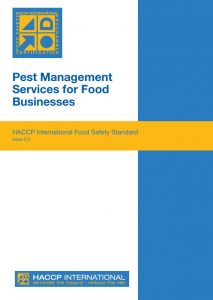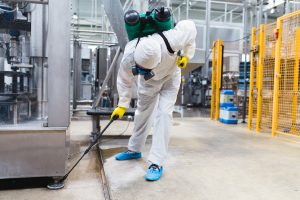I’m sometimes asked if it is mandatory for a food business to use a ‘HACCP International certified’ Pest Controller in order to comply with various food safety standards. While the answer is ‘no’, that is probably the only way to be absolutely certain of the contractor’s ability. Regardless, you do need to select a pest controller that delivers the requirements of the food safety management standards you are certified to and one that actively manages food safety risk from their activities.

Download the standard which certified suppliers are audited against.
In addition to the pests they are tasked with controlling, pest controllers themselves can pose a significant risk to food safety. There have been contamination events documented where pest control chemicals have contaminated food resulting in consumer illness. Further, I have personally witnessed a pest controller using a residual insecticide directly above an open vat of food resulting in certain contamination of the product stream. Trust me; there are bad guys out there.
So, how does one select the good guys? Well here is a list of elements that the food industry and I would require to be considered during the selection process.

A Defined Service.
The pest controller should be able to define the service offered in terms of;
- The facility areas to be treated
- The treatment methodology including chemicals used (including safety data sheets) and physical devices deployed
- The frequencies of treatment and review
- The technical expertise of the technicians
Documented procedures.
The pest controller should be able to provide documented procedures or SOPs covering issues such as;
- Standard operating procedures for activities on food sites
- Procedures for chemical handling storage and spills
- A register of chemicals used on site
- How devices are located on site, identified and labelled

Record Keeping and delivery.
The pest controller should be able to deliver reports contained in a site register in regard to pest control activities such as;
- Service reports including treatments executed including chemicals used, dilution rates and batch codes
- Pest sighting reports
- Site maps with labelled devices
- Pest monitoring records
- Opportunities for improved pest control and proofing
- Client feedback
Risk and Service Management Processes
The pest controller should be able to demonstrate programmes such as;
- Internal audit systems for continued compliance to procedures
- Hand Washing policies
- Licensing, insurance and regulatory compliance
- Clothing and jewellery policies
- Procedures in case of food borne illness
- Training in procedures and food safety risk management
- Procedures to mitigate food safety risk in case of errors in applications
These are considered to be key considerations when selecting a pest control contractor that meets the demands of appropriate risk management strategies, the requirements of Food Safety Management Programmes and those of the food industry in general. Each of these elements should be reviewed favourably for a pest controller to be awarded a service contract in the food industry.
The alternative to critically reviewing each of these elements by the individual food industry is to simply select a pest controller who has achieved HACCP International Certification. In this case you know that each element has already been reviewed, audited and verified by highly qualified and independent food industry experts.

By Martin Stone,
Technical Director, HACCP International
